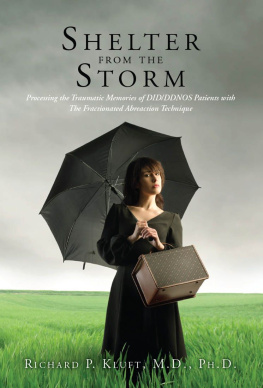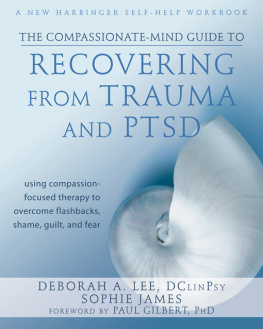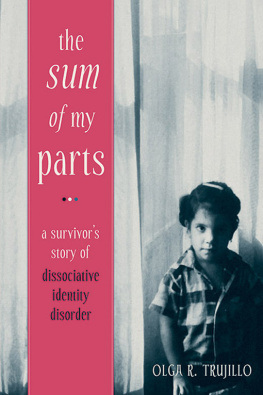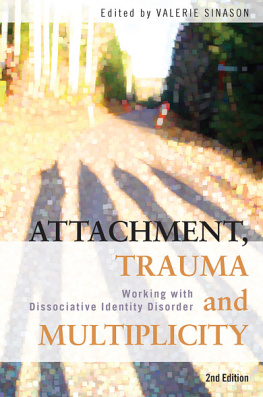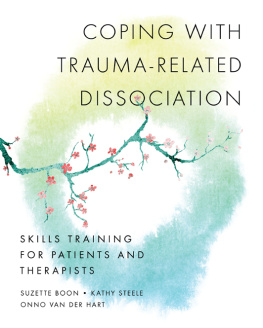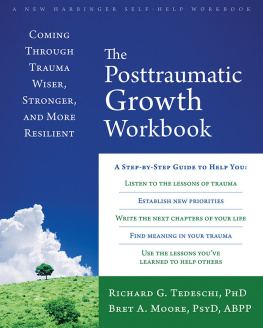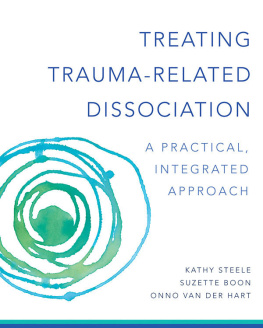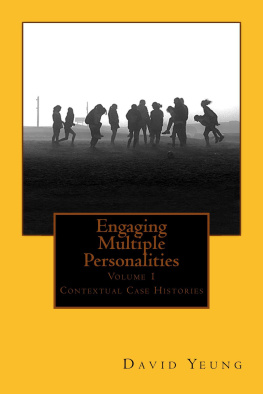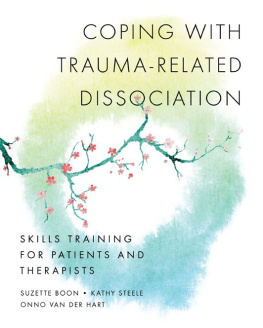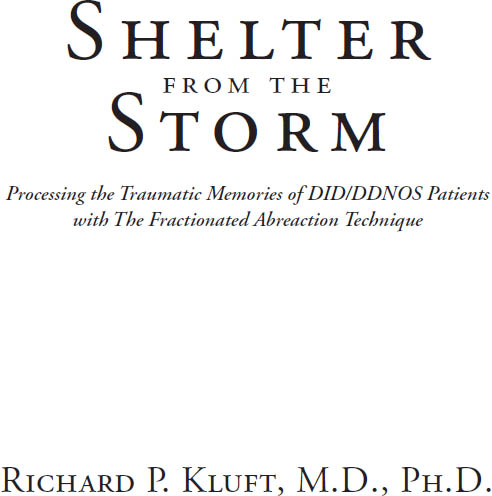
Copyright 2013 Richard P. Kluft, M.D., Ph.D.
All rights reserved.
ISBN: 1481916696
ISBN 13: 9781481916691
eBook ISBN: 978-1-63001-154-3
Library of Congress Control Number: 2013900667
CreateSpace Independent Publishing Platform
North Charleston, South Carolina
Indexing by Clive Pine Book Indexing Services
http://www.cpynebook indexing.com
ADVANCE ACCLAIM FOR
SHELTER FROM THE STORM- - - -
(MORE DETAILED COMMENTARIES FOLLOW)
Enjoy this book!
David Spiegel, M.D.
Shelter from the Stormis a truly brilliant and absolutely unique learning experience in the form of a book written by the master in the clinical field of Dissociative Identity Disorder (DID).
Onno van der Hart, Ph.D.
This book should be required reading for all who treat complex trauma survivors. It will increase their skill level and make trauma-focused treatment tolerable for severely traumatized clients.
Bethany Brand, Ph.D.
Dr. Kluft tells a story full of clinical gems and memorable pearls of wisdom. I would recommend this unique book to therapists at all levels of experience.
Ira Brenner, M.D.
A must-have for therapists already familiar with the basic treatment approaches to dissociative disorders.
Suzette Boon, Ph.D.
The authors sense of humor makes the reading fun sometimes, which is a surprising relief because the case illustrations are incredibly tragic. I find myself intensely immersed in reading, and I hear myself giggling with silent laughter. What a nice mixture of humor and education!
Susanna Carolusson, M.Sc.
This is a book not only for specialists but also for anyone interested in consequences of psychological trauma and how it can be treated.
Vedat Sar, M.D.
Their More Detailed Commentaries Follow
ADVANCE ACCLAIM FOR
RICHARD KLUFTS
Shelter from the Storm
Dr. Richard Kluft has provided a leading professional voice of reason, clinical savvy, and respectful concern for people with dissociative disorders over many decades. Our field and those with the disorders are much the better for his teaching, writing, and psychotherapy. Enjoy this book!
David Spiegel, M.D.
Associate Chairman of the Department of Psychiatry and Behavioral Sciences and The Jack, Samuel and Lulu Willson Professor, Stanford University School of Medicine
Shelter from the Stormis a truly brilliant and absolutely unique learning experience written by the master in the clinical field of dissociative identity disorder (DID). Just as in his highly instructive workshops, Richard Kluft uses literary devices and, I suspect, many elements of Ericksonian hypnosis, to make adult learning as engaging, enjoyable and effective as possible. His main focus is to instruct clinicians in the safest and most effective ways to help DID patients integrate their traumatic memories. Most demanding and potentially highly disruptive, this clinical challenge nevertheless needs to be met in order for patients to heal and be able to lead healthy lives. In this book, Klufts dominant literary device is the personification of his pioneering and much copied Fractionated Abreaction Technique. This technique, personified as the FAT Man, becomes the main narrator. Kluft himself and treatment in general become the objects of the FAT mans comments. Although I do not entirely agree with some of the theoretical concepts used in this book, I find myself incredibly enriched by this truly enjoyable learning experience, as will all those who read it.
Onno van der Hart, PhD
Emeritus Professor of Psychopathology
of Chronic Traumatization
Utrecht University, Utrecht
The Netherlands
Richard Kluft has creatively used two personas to tell the fascinating history and depict the use of The Fractionated Abreaction Technique, represented satirically as the persona of The FAT Man. The FAT technique is an indispensable clinical tool for the treatment of individuals with complex dissociative disorders. Seen through the eyes of The FAT Man, readers are introduced to the diverse ways in which this technique can be adapted to make trauma processing manageable for a range of clients, including those who are medically compromised or emotionally phobic. Even experienced clinicians will gain a great deal from reading this book due to its foundation of rich clinical cases. Readers will feel as if they have been allowed to step inside Dr. Klufts treatment room, to observe his masterful work and discuss with this superb clinician the process of treatment planning and decision-making. This book should be required reading for all who treat complex trauma survivors as it will increase their skill level and make trauma-focused treatment tolerable for severely traumatized clients.
Bethany Brand, Ph.D., Professor of Psychology at Towson University, Baltimore MD; Principal Investigator, TOP Dissociative Disorders Study
Richard P. Kluft, M.D., Ph.D. is an internationally acclaimed pioneer in the treatment of dissociative disorders. InShelter from the Storm, he offers us a remarkably creative and entertaining way of appreciating and learning to use his historic contribution. Through the clever and apt personification of his groundbreaking Fractionated Abreaction Technique, Dr. Kluft tells a story full of clinical gems and memorable pearls of wisdom. I would recommend this unique book to therapists at all levels of expertise and experience. They most certainly will be rewarded!
Ira Brenner, M.D., Clinical Professor of Psychiatry, Thomas Jefferson University; Training and Supervising Analyst, Psychoanalytic Center of Philadelphia
It was unconventional in the late eighties to allow two novices in the treatment of dissociative disorders to observe therapy sessions with DID clients. But this is what Dr. Richard Kluft did, and in this way he gave me one of the most intense and valuable educational experiences I encountered in my learning about the treatment of Dissociative Identity Disorder. I am still grateful to him and to his generous and courageous patients, who tolerated the intrusion of me and my colleague, Onno van der Hart into their psychotherapeutic work with him. Dedicated, caring, not giving up no matter what happened, Dr. Kluft persisted with a fierce sense of humor, each and every session. And now almost 25 years later he has taken his masterful therapeutic approaches and shared them in an unconventional book on the treatment of traumatic memories of complex dissociative disorder patients, describing The Fractionated Abreaction Technique. This book, written as a novel from the most interesting perspective of The FAT Man (this technique in person), offers rich case material that excellently illustrates Dr. Klufts pioneering work with these often difficult and extremely traumatized individuals. A must-have for therapists already familiar with the basic treatment approaches to dissociative disorders.
Suzette Boon, Ph.D.
Clinical Psychologist/Psychotherapist
Top Referent Trauma Center, Zeist
The Netherlands
This book is composed of several autobiographies The autobiographies of a therapist, of a therapists patients, and last but not least, of a psychotherapeutic technique. It may be unusual to talk about the autobiography of a psychotherapeutic technique; however, this is the angle from which the author prefers to look at more than three decades of his professional life. Thus, the protagonist of this novel is the psychotherapy technique he described initially, has shared with his colleagues over years, and has observed as this product took a life of its own. The book is rich on case stories, a sine qua none for the proper understanding of what is meant when discussing a clinical subject, like the use of a technique. But at the same time it is a book on psychotherapy in general, and on treatment of dissociative identity disorder in particular. As suggested by the name the personification of the technique (The FAT Man) gives to the therapist co- protagonist of this novel (The Mixologist), this book is in a position to make an attempt to integrate insights based on psychotraumatology, hypnosis, general medicine, and clinical psychiatry. While psychotherapy itself remains a fragmented field, it also remains the only tool to integrate the mind of a person who has been subjected to severe stress by humans misusing their power. Fortunately, this kind of healing is a mission possible, and this novel conveys to the reader the cumulative experience and insight of a therapist who has witnessed the success of such missions repeatedly. This is a book not only for specialists but also for anyone interested in consequences of psychological trauma and how it can be treated. Anyone who has struggled with difficulties of teaching proper psychotherapy will respect the authors attempt to develop a new approach to making this possible. He has created and pioneered a narrative approach to clinical education which has not been explored in the past.
Next page
